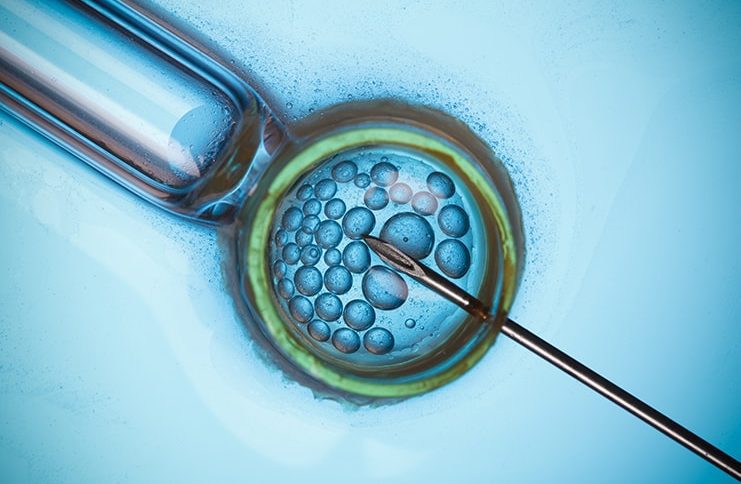
If you’ve never had in vitro fertilization (IVF) treatment, it can feel overwhelming to start the process. You may have heard horror stories of all of the drugs you need to take to stimulate your egg production.
If you’re anything like me, you can’t even look at a nurse when she’s taking your blood because needles make you queasy. Now you may be looking at frequent bloodwork appointments at the clinic, daily shots at home, and unpredictable hormone fluctuations.
I get it.
The good news is that science has enabled millions of people to have healthy babies via IVF. Chances are, your fertility clinic has many success stories of people who got pregnant this way.
Get ready to pull your sleeves up and your pants down. This part doesn’t sound fun, I know, but information is power for both you and your fertility doctor.
For people who have had issues with infertility, IVF has a higher success rate than Intrauterine Insemination (IUI). According to Dr. Michael Zinger, a fertility doctor at Long Island IVF, ”Some couples are found to have specific problems that require IVF. In those cases, IUI would have little to no chance of working. Even in cases where either IUI or IVF can be used, IVF is typically four times as likely to work.”
When it comes to IVF versus IUI, my sister, who had both treatments before having her daughter via in vitro, put it like this: The process of IUI is like going on a dating site to meet someone. You may find each other, just like the sperm may find the egg in the body; but it’s not always easy to find your match. IVF is like getting set up on a blind date. You may or may not match, just like the egg and sperm may not match; but because you are thoughtfully paired together (in this case, in a Petri dish), your chances of compatibility are generally higher.
Whether or not this analogy rings true, the reality is that IVF never quite feels natural, just like blind dating! There will be times when you’ll feel like a junkie with your box of shots; but when you look at the big picture — that this may help you achieve your goal of having a child — it will make more sense.
There are three parts to the IVF Process:
1) Preparing Your Body: Here, you analyze your hormones with the doctor and prepare your body to grow your follicles.
2) Retrieving Your Eggs: At this stage, the doctor retrieves your eggs and collects your partner’s and/or donor’s sperm in an effort to produce embryos.
3) Transferring of Embryos: Finally, you do either a “fresh” or “frozen” transfer in which the embryos are put into your (or a surrogate’s) body.
Here’s what you can expect when you start the first phase of the IVF process.
Feeling Comforted AND Overwhelmed After Your First Fertility Consultation
The first step of IVF is to do an intake interview with the fertility specialist, a reproductive endocrinologist. You likely got a referral to see him or her from your general practitioner, or maybe you found this doctor through a friend or a review online. Or, maybe you’re there because the office is close to your home or work and they take your insurance.
However you ended up at the fertility clinic, it’s good news that you’re being proactive about your goal of having a baby.
During the first meeting, you’ll discuss your fertility and family medical history, your goals, and your options with the doctor. He or she will review what you can expect during the course of the three week or so IVF treatment.
Chances are, you’ll be asked to return to the office shortly after your first consultation if you are ready to start the IVF treatment plan.
Tip: Bring out your digital or paper calendar and have the doctor review with you a general outline and timeline of what treatment will look like during the month you are targeting. Ask when, approximately, he or she would anticipate doing the egg retrieval. I’ve always found it helpful to have my expectations set, as much as I’m able to during this often unpredictable process.
Being Tested
Get ready to pull your sleeves up and your pants down. This part doesn’t sound fun, I know, but information is power for both you and your fertility doctor.
The staff of the fertility clinic is going to administer a number of tests on you and your partner, if you have one. There are some required, routine, initial blood tests that are usually done at your first visit to look for risks to your planned pregnancy. Essentially, they are testing to make sure that you, and/or partner, don’t have health problems or infections. Often, you will be screened for genetic diseases that can be passed on to your offspring. Whether or not you are a carrier, the fertility treatment can be customized to avoid having inheritable diseases passed on. (Bonus points for fertility treatments!)
Doctors usually suggest doing these tests sooner than later, because results may take a while and can delay your treatment.
Finally, after your first consultation, you may be asked to schedule some testing to evaluate your fertility, including a blood test on Day 3 of your period to evaluate egg quality, an X-ray to check if your fallopian tubes are open, and a semen analysis for the male partner, if there is one.
Getting An Education
If you’re going for IVF treatment for the first time, you’ll have an education session with a group of other patients or one-on-one with a nurse practitioner before you start your treatment.
Nobody will (or should!) go into doing shots and meds for IVF without feeling fully informed. If you need shots, you’ll learn how to mix drugs for the shots and when and where to inject them.
Go with a friend or your partner to this appointment so you’re both armed with the knowledge of the drug plan. If you go alone, express any concerns to the health professional teaching you. She’s heard it all and is there to help.
Tip: It’s totally normal to feel a little overwhelmed at this stage after all the tests and then the education session. I remember wanting to cancel my first IVF treatment after sitting with the nurse for a few minutes. Nothing she said sounded familiar and I didn’t want to practice doing the shots on the bouncy stress ball offered to me. (I wanted to squeeze the stress ball, instead!)
If possible, go with a friend or your partner to this appointment so you’re both armed with the knowledge of the drug plan. If you go alone, express any concerns to the health professional teaching you. She’s heard it all and is there to help.
Taking Drugs to Pump Your Eggs
You will be asked by your clinic to order a number of drugs that sound like Star Trek planets and come in the form of pills and shots. When you open the package of drugs or pick up your prescription from the pharmacy, you may be surprised by how much you see.
During traditional IVF stimulation, the drug “kit” you get includes various pills to be taken on a set schedule. You’ll also get needles to inject some meds into the bloodstream via the skin and some to inject into the muscles. The kit may include pre-filled syringes; but in many cases, you’ll be asked to mix specific ingredients and fill the syringes yourself. (All of this will be explained by your clinic in your education session before you start.)
The purpose of these pills and shots is to stimulate development of multiple eggs and to suppress ovulation, when necessary. Then, when your eggs are mature, you’ll be asked to take one “trigger shot” that causes ovulation to happen exactly 36 hours later. (IVF is precisely timed, as you can see!) The next step is to go back to your clinic for monitoring and egg retrieval.
Tips: If you can’t recall anything from your education session, keep in mind that pretty much every drug and application used during IVF can be found in a tutorial on YouTube.
If you’re paying out of pocket for your fertility drugs, costs can add up very fast. Ask your clinic if they have “compassion” (donated) drugs that they can share or have any rebate offers for you.
Going to the Fertility Clinic. Often.
During your IVF cycle, expect to go to your fertility clinic a lot. In some cases, you may not see the doctor very much; but he or she will be regularly reviewing your charts and the nurses will keep you updated on your treatment plan.
Following your first few days on fertility meds, your clinic will likely want you to come into the office every two to three days for blood-work and ultrasounds.
When you get closer to the “trigger,” around the time that your egg retrieval session will happen, you’ll likely be asked to go to the fertility clinic daily for monitoring.
Tip: Knowing how often you’ll be at the doctor over three weeks or so, means that you should try to schedule your IVF treatment when you’re not crazy at work or have other commitments that don’t allow for schedule flexibility. If you can’t find an ideal month to schedule for your IVF cycle, your clinic may have availability for appointments before work in the morning.
If your clinic has wi-fi, bring your laptop or other tools for keeping busy. You may be surprised by how productive you can be while you wait your turn for monitoring. (It’s amazing how many articles I wrote while staring at a picture of a uterus in my doctor’s waiting room!)
In Part 2, we’ll look at what your egg retrieval appointment may look and feel like, and how to best recover after the procedure. (Spoiler alert: The recovery time isn’t generally very long.) Stay tuned…
Contributor
Andrea Syrtash
Andrea Syrtash is the founder and editor-in-chief of pregnantish. She is a relationship expert and coach regularly featured on national TV shows including Good Morning America and The Today Show, and in Cosmopolitan, Glamour, and Women's Health magazines. She's the author of five popular books including He's Just Not Your Type (And That's A Good Thing) and Cheat On Your Husband (With Your Husband). She's passionate about helping people live and love authentically. For more, visit andreasyrtash.com

Listen to stories, share your own, and get feedback from the community.


















